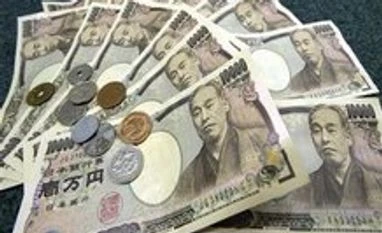Japan suffered a record trade deficit in January as growth in exports spurred by a weak yen was far outstripped by a surge in import costs, raising fresh doubts about Prime Minister Shinzo Abe's strategy to spark an economic revival.
The trade numbers came on the heels of a survey showing manufacturers' sentiment worsened in February in a sign that businesses were bracing for a chill in demand after a planned sales tax increase takes effect in April.
The drumbeat of disappointing data threatens to slam the brakes on the world's third-largest economy barely a year after Abe set about recharging growth with a potent mix of fiscal and monetary stimulus.
Also Read
Exports rose 9.5% in January, Ministry of Finance (MOF) data released on Thursday showed, though growth slowed for the third straight month with the effect of the softer yen on shipments outweighed by a substantial rise in import costs.
The trade balance came to a deficit of 2.79 trillion yen in January -- a record 19th straight month of shortfalls -- as imports rose 25% to a record amount.
The ballooning deficit is a reminder that a weak yen alone cannot boost exports as Japanese firms are shifting production abroad, while overseas demand lacks strength needed to offset a blow from the planned sales tax hike.
A stumble in the economy could force policymakers to resort to further stimulus to prop up growth, although at this week's meeting the Bank of Japan ruled out the immediate need for more monetary steps.
The BOJ's stance was reiterated again on Thursday by board member Yoshihisa Morimoto, who said the economy can continue to exceed its potential growth rate even after the tax increase.
Morimoto, a former utility executive, stuck to the BOJ's assessment that Japan's economy was headed for a moderate recovery and making steady progress toward achieving the central bank's 2% inflation target.
Still, many analysts were guarded about the near term
"If the economy weakens further after a sales tax hike, policymakers could resort to fiscal stimulus as early as summer. The BOJ could ease policy further later this year if it becomes clear that its 2% inflation target cannot be met," said Yasuo Yamamoto, senior economist at Mizuho Research Institute.
MANUFACTURERS' MOOD DARKENS
Morimoto, speaking to reporters, acknowledged that exports have been weak but added that this was not enough to constitute a risk to Japan's economy.
Morimoto also said that if the BOJ felt it had to change its forecasts it would adjust policy proactively and the central bank was not limited to reacting to changes in economic data.
On Monday, data showed the economy grew at a much slower pace than expected as exports, consumption and business investment disappointed.
Worryingly, a Reuters poll showed sentiment at Japanese manufacturers slipped in February for the first time in five months and was seen sliding further, a sign the economy may be ill-equipped to cope with the tax hike without further stimulus.
Much of Abe's strategy is reliant on companies buying into the view that the economy has enough momentum to break years of stubborn deflation and slack demand, spurring higher wages, consumption and growth.
But with the economy having to steer through speed bumps, including from the April tax rise, the Federal Reserve's tapering of its stimulus and stress in emerging markets, businesses remain cautious.
Companies surveyed also voiced concern about weak shipments to China and risks from emerging market economies which are key markets for Japanese goods.
"It will take time for overall demand to recover," a nonferrous metals company said in the Reuters survey.
One retailer said: "Construction demand before a sales tax hike has been brisk, but other goods are not selling well."
Abe's reflationary policies have weakened the yen by about 20% in the year to January, supporting the value of export receipts in yen terms and helping exporters' earnings. But they have so far failed to shore up volumes.
The MOF data showed export volumes fell 0.2% in January from a year before.
Underscoring flagging shipments, the Reuters poll also showed the manufacturers' mood was dampened by electric machinery and precision machinery industries -- two key export sectors.
Government officials said last-minute demand before a sales tax increase in April helped boost imports while exports tend to slow in January due in part to New Year holidays.
The government will increase the sales tax in April to 8% from 5%, and consumers have been buying cars, homes and durable goods before the increase.
Imports have been pushed up by the weak yen and strong demand for fossil fuels to make up for nuclear power lost since the 2011 Fukushima crisis.
Analysts say the monthly trade gaps may narrow in coming months as a global recovery boosts export demand and a surge in consumer spending eases after the tax increase kicks in.
There are worries in some quarters that the trade shortfalls could pull the current account into the red in coming years, meaning that Japan may start chipping away at its vast pool of domestic savings and increasing the need to rein in its huge public debt.
(Additional reporting by Izumi Nakagawa; Editing by Chang-Ran Kim, Shri Navaratnam and Jacqueline Wong)
)